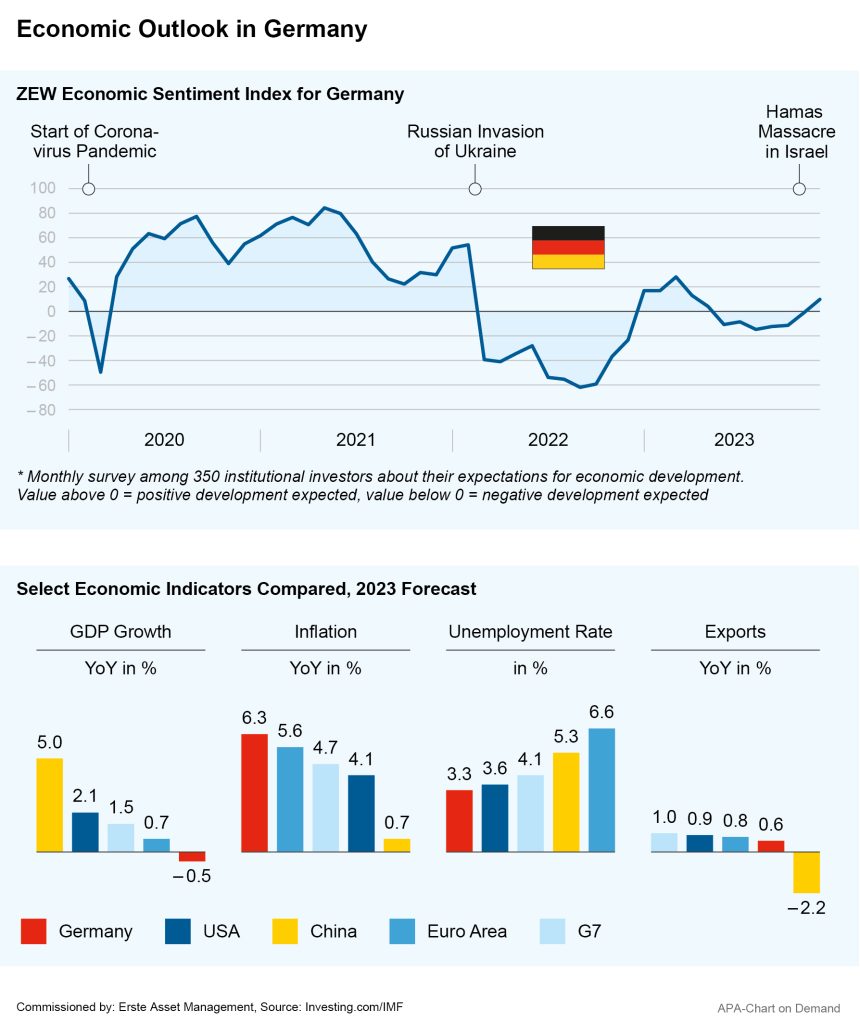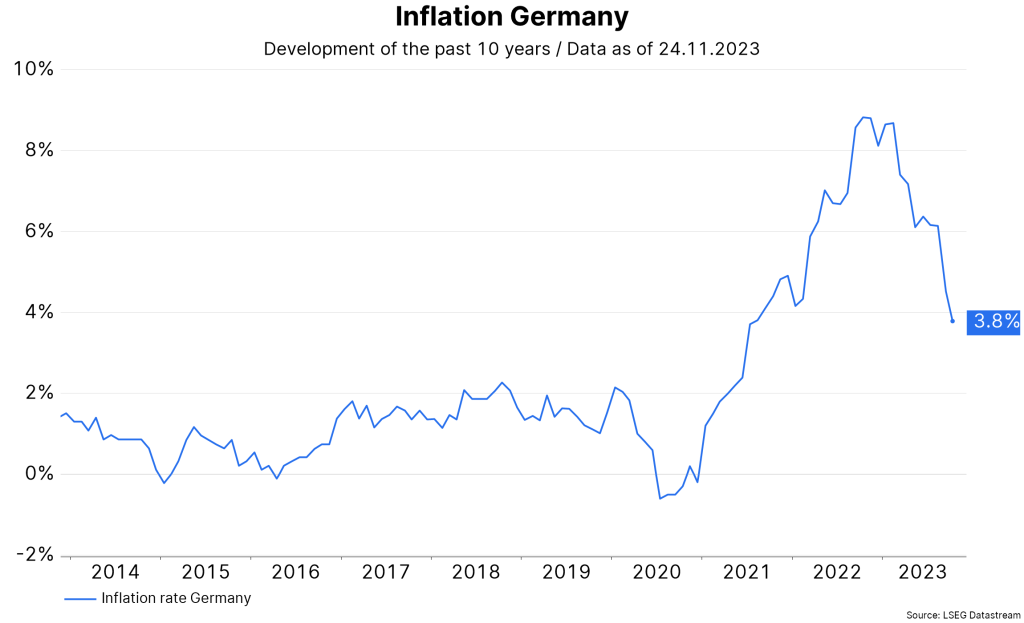
The sentiment among Stock market professionals about the prospects for the German economy over the next six months is less pessimistic. The economic index calculated by the Centre for European Economic Research (ZEW) based on surveys of analysts and investors rose by a surprising 10.9 points to plus 9.8 points in November. This marks the fourth consecutive month that the ZEW index, a popular indicator on the stock markets, has risen and is now back above zero for the first time since April. Economists previously expected an increase to 5.0 points above zero.
The assessment of the current economic outlook also stabilized, according to the ZEW survey. The corresponding index rose slightly by 0.1 points to minus 79.8 points. “This confirms the impression that the economic trend in Germany has bottomed out,” ZEW President Achim Wambach said about the data published last week.
The business climate among small and medium-sized enterprises also improved slightly in October after five consecutive declines. The corresponding index rose by 2.1 points to minus 17.1 balance points, according to the most recently published KfW-Ifo data. This is due to an improved assessment of the situation. Expectations also increased. “The SME business sentiment turned around in October. This further solidifies the picture that the economic downturn has finally bottomed out,” KfW Chief Economist Fritzi Köhler-Geib said.

Note: Past performance is not a reliable indicator for future performance.
Economy Expected to Gain Momentum After Technical Recession in 2024
Germany’s economy shrank by 0.1 per cent in the summer. If the economy continues to weaken in Q4 as expected by economists, it would enter a temporary, so-called technical recession. In its latest report on the global economy, the International Monetary Fund (IMF) forecasts a GDP decline of 0.5 per cent for Germany this year. This would make Germany the only major economy to shrink.
The German Ministry of Economic Affairs also sees the country continuing to stagnate for the time being. However, the country’s government expects Europe’s largest economy to regain its footing next year. Accordingly, growth rates of 1.3 and 1.5 per cent are expected in 2024 and 2025. After a GDP decline of 0.4 per cent this year, the Council of Economic Experts also predicts growth of 0.7 per cent from 2024.
General Conditions Improve, Inflation Declining Further
The general conditions have recently improved somewhat in view of significantly falling inflation rates, rising real incomes and a slight improvement in economic sentiment, according to the Ministry of Economic Affairs. The recently published data on wholesale prices, for example, indicate a further decline in inflation.
Wholesale prices fell by 4.2 per cent in October in a year-over-year comparison. This is the sharpest decline since May 2020, when the coronavirus pandemic caused enormous economic upheaval. The main reason for the fall in prices was cheaper petroleum products. Producer prices also fell significantly in October for the fourth month in a row. Producers of industrial products charged an average of 11.0 per cent less than a year earlier. In September, prices fell by 14.7 per cent, the biggest drop since the survey was first conducted in 1949.
Producer and wholesale prices are reflected in consumer prices with a certain time lag. Economists therefore expect consumer prices to continue to fall. In October, consumer prices rose by 3.8 per cent, the smallest increase in over two years.

Note: Past performance is not a reliable indicator for future performance.
The labour market also recently provided positive news. Despite the economic downturn, the number of people in employment in Germany rose above the 46 million mark for the first time in Q3, reaching an all-time high. From July to September, 46.04 million people were employed, as reported by the Federal Statistical Office last week. Service providers saw a particularly strong increase in employees during the summer, with the number of people in employment rising by 299,000 or 0.9 per cent compared to the same quarter last year.
Government Planning new Package of Measures to Provide Additional Support For The Economy
The government also wants to revitalise the economy with additional measures. In November, the German Bundestag passed a package of measures to stimulate the economy. The so-called Growth Opportunities Act, which still has to be approved by the Bundesrat, will offer tax relief for companies until 2028 and accelerated authorisation procedures.
The relief to the tune of EUR 7bn per year includes a bonus for investments in climate protection. 15 per cent of expenditure on energy efficiency measures by companies is to be subsidised as direct financial support. Tax incentives are also planned to boost the crisis-ridden housing construction sector, and additional tax incentives for more research are also planned.
For a glossary of technical terms, please visit this link: Fund Glossary | Erste Asset Management
Legal note:
Prognoses are no reliable indicator for future performance.
Legal disclaimer
This document is an advertisement. Unless indicated otherwise, source: Erste Asset Management GmbH. The language of communication of the sales offices is German and the languages of communication of the Management Company also include English.
The prospectus for UCITS funds (including any amendments) is prepared and published in accordance with the provisions of the InvFG 2011 as amended. Information for Investors pursuant to § 21 AIFMG is prepared for the alternative investment funds (AIF) administered by Erste Asset Management GmbH pursuant to the provisions of the AIFMG in conjunction with the InvFG 2011.
The currently valid versions of the prospectus, the Information for Investors pursuant to § 21 AIFMG, and the key information document can be found on the website www.erste-am.com under “Mandatory publications” and can be obtained free of charge by interested investors at the offices of the Management Company and at the offices of the depositary bank. The exact date of the most recent publication of the prospectus, the languages in which the fund prospectus or the Information for Investors pursuant to Art 21 AIFMG and the key information document are available, and any other locations where the documents can be obtained are indicated on the website www.erste-am.com. A summary of the investor rights is available in German and English on the website www.erste-am.com/investor-rights and can also be obtained from the Management Company.
The Management Company can decide to suspend the provisions it has taken for the sale of unit certificates in other countries in accordance with the regulatory requirements.
Note: You are about to purchase a product that may be difficult to understand. We recommend that you read the indicated fund documents before making an investment decision. In addition to the locations listed above, you can obtain these documents free of charge at the offices of the referring Sparkassen bank and the offices of Erste Bank der oesterreichischen Sparkassen AG. You can also access these documents electronically at www.erste-am.com.
Our analyses and conclusions are general in nature and do not take into account the individual characteristics of our investors in terms of earnings, taxation, experience and knowledge, investment objective, financial position, capacity for loss, and risk tolerance. Past performance is not a reliable indicator of the future performance of a fund.
Please note: Investments in securities entail risks in addition to the opportunities presented here. The value of units and their earnings can rise and fall. Changes in exchange rates can also have a positive or negative effect on the value of an investment. For this reason, you may receive less than your originally invested amount when you redeem your units. Persons who are interested in purchasing units in investment funds are advised to read the current fund prospectus(es) and the Information for Investors pursuant to § 21 AIFMG, especially the risk notices they contain, before making an investment decision. If the fund currency is different than the investor’s home currency, changes in the relevant exchange rate can positively or negatively influence the value of the investment and the amount of the costs associated with the fund in the home currency.
We are not permitted to directly or indirectly offer, sell, transfer, or deliver this financial product to natural or legal persons whose place of residence or domicile is located in a country where this is legally prohibited. In this case, we may not provide any product information, either.
Please consult the corresponding information in the fund prospectus and the Information for Investors pursuant to § 21 AIFMG for restrictions on the sale of the fund to American or Russian citizens.
It is expressly noted that this communication does not provide any investment recommendations, but only expresses our current market assessment. Thus, this communication is not a substitute for investment advice.
This document does not represent a sales activity of the Management Company and therefore may not be construed as an offer for the purchase or sale of financial or investment instruments.
Erste Asset Management GmbH is affiliated with the Erste Bank and austrian Sparkassen banks.
Please also read the “Information about us and our securities services” published by your bank.


